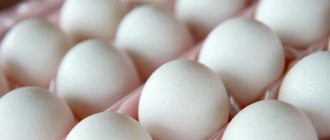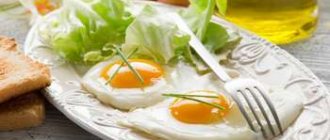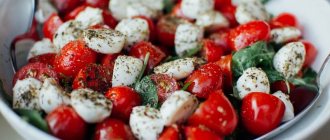- August 19, 2018
- Diets
- Rosalia Rison
Today we will talk about such a useful product as a chicken egg. What is its use? Why should humans eat eggs? What is the calorie content of 1 pc. chicken egg white? For what purposes are eggs used in cooking? We will also look at what can be prepared from them. So let's start with the general benefit.
The benefits of eggs for the body
There are at least several reasons to use this product. Let's study them so as not to be unfounded.
- The yolk contains vitamin D, which is necessary for children and adolescents, because it contributes to the proper formation of teeth, bones, skeleton and nervous system. Eggs are second only to badger and fish oil in terms of the content of this vitamin.
- Egg white can eliminate headaches, as it is responsible for normalizing blood pressure in our body. Both arterial and intracranial.
- Vitamin B4, which is contained in protein, has a beneficial effect on the nervous system and activates mental activity.
- Eggs are able to cleanse your body of toxins and expel excess fluid from the body.
- Eggs have a positive effect on the reproductive system of men and women. Since their consumption produces serotonin.
- The presence of folic acid indicates that eggs are a very important product for pregnant women, which helps the fetus develop normally.
- Omega acids cleanse blood vessels and prevent the development of their diseases.
- Vitamin E, which is part of eggs, is responsible for beauty, namely, it helps maintain healthy hair, skin and nails.
- The presence of calcium in eggs suggests that this product helps maintain teeth and bones in good condition.
- Egg white is characterized by rapid digestibility by the body. Moreover, eggs are one of those rare products that are completely absorbed by the body.
- Eggs help avoid depression and mood swings. They relieve insomnia and promote good sleep, so if you have such problems, you should eat this protein product three hours before bedtime.
- Due to their high protein content, eggs are recommended for athletes who want to gain muscle mass.
- Eggs are an excellent product for losing weight. Calorie content 1 pc. boiled egg white is 18 kcal. Agree, very little. Therefore, for weight loss to be effective, it is better to eat eggs without the yolk. Since it contains 64 kcal, which exceeds the calorie content of 1 piece. boiled egg white almost 3.5 times.
Table
| element name | quantity | daily norm | |
| The nutritional value | |||
| Calorie content | 158.7 mg | ||
| Squirrels | 12.828 g | ||
| Carbohydrates | 707 mg | ||
| Fats | 11.616 g | ||
| Vitamins | |||
| Vitamin B3 | 0.192 mg | 15.059 mg | |
| Vitamin B2 | 0.444 mg | 1.329 mg | |
| Vitamin PP (NE) | 2.321 mg | 15.059 mg | |
| Vitamin B1 | 0.071 mg | 1.159 mg | |
| Vitamin E (TE) | 0.606 mg | 10.882 mg | |
| Vitamin C | 0 | 69.118 mg | |
| Provitamin A | 0.061 mg | 5 mg | |
| Vitamin A (VE) | 0.263 mg | 0.753 mg | |
| Vitamin B5 | 1.313 mg | 3.794 mg | |
| Vitamin B6 | 0.141 mg | 1.512 mg | |
| Vitamin B9 | 7.071 mcg | 285.9 mcg | |
| Vitamin H | 0.02 mg | 0.034 mg | |
| Vitamin A | 0.253 mg | 0.753 mg | |
| Vitamin E | 2 mg | 15 mg | |
| Vitamin B12 | 0.525 mcg | 3 mcg | |
| Vitamin B4 | 253.54 mg | 500 mg | |
| Vitamin D | 2.222 mcg | 10.9 mcg | |
| Vitamin K | 0.3 mcg | 85.4 mcg | |
| Macronutrients | |||
| Calcium | 55.56 mg | 987.5 mg | |
| Magnesium | 12.12 mg | 276.177 mg | |
| Sodium | 135.35 mg | 948.824 mg | |
| Potassium | 141.41 mg | 1807.143 mg | |
| Phosphorus | 193.9 mg | 852.941 mg | |
| Sulfur | 177.78 mg | 1000 mg | |
| Silicon | 0 | 30 mg | |
| Microelements | |||
| Iron | 2.525 mg | 13.75 mg | |
| Chlorine | 157.58 mg | 2300 mg | |
| Copper | 0.084 mg | 0.806 mg | |
| Manganese | 0.029 mg | 2 mg | |
| Fluorine | 0.056 mg | 3 mg | |
| Bor | 0 | 1.4 mg | |
| Aluminum | 0 | 40 mg | |
| Titanium | 0 | 0.85 mg | |
| Strontium | 0 | 1.5 mg | |
| Iodine | 0.02 mg | 0.131 mg | |
| Zinc | 1.121 mg | 9.706 mg | |
| Chromium | 4.04 mcg | 33.7 mcg | |
| Molybdenum | 6.061 mcg | 70 mcg | |
| Vanadium | 0 | 0.01 mg | |
| Cobalt | 0.01 mg | 0.1 mg | |
| Nickel | 0 | 0.1 mg | |
| Rubidium | 0 | 0.2 mg | |
| Lithium | 0 | 0.2 mg | |
| Selenium | 0.032 mg | 0.04 mg | |
| Tin | 0 | 0.7 mg | |
| Zirconium | 0 | 0.5 mg | |
| Other elements | |||
| Alimentary fiber | 0 | ||
| Organic acids | 0 | ||
| Water | 74.1 g | ||
| Mono- and disaccharides | 707 mg | ||
| Ash | 1.01 g | ||
| Alcohol | 0 | ||
| Starch | 0 | ||
| Saturated fatty acids | 3 g | ||
| Cholesterol | 575.76 mg | ||
| Unsaturated fatty acids | 0 | ||
This table shows the average norms of elements for an adult.
Harm to eggs
Everything has a downside. Let's look at why eggs should be eaten in moderation.
- Don't forget that consuming too much protein can harm your body. Just eat your norm: 1.5-2.5 grams of protein per kilogram of a person’s weight.
- There is still debate about whether egg yolks contain cholesterol. However, defenders of this product argue that cholesterol is divided into harmful and beneficial, and eggs contain the latter type.
- There is also egg intolerance. Moreover, they can cause allergic reactions in some people.
- Don't forget that fried eggs contain bad cholesterol. It is better to use them in any other form (preferably boiled).
- You should not eat eggs if you have gallbladder diseases.
Chemical composition
The composition of chicken eggs automatically transfers them to the category of healthy, nutritious food products. Per 100 grams they contain:
- vitamins – A, B1, B2, B4, B5, B6, B9, B12, D, E, H (biotin), K, PP, beta-carotene;
- macroelements - potassium, calcium, magnesium, sodium, sulfur, phosphorus, chlorine;
- microelements – iron, iodine, cobalt, manganese, copper, molybdenum, selenium, natural fluorine, chromium, zinc;
- digestible carbohydrates – disaccharides, monosaccharides;
- sterols - cholesterol.
It is interesting to know how much protein is contained in one chicken egg.
It is worth mentioning the amino acids separately:
- essential – arginine, valine, histidine, leucine, lysine, methionine, cysteine, tryptophan, phenylalanine, tyrosine;
- replaceable - alanine, aspartic and glutamic acid, glycine, proline, serine.
And also fatty acids:
- saturated - myristine, pentadecane, palmitine, margarine, stearine, arachine;
- monounsaturated – palmitolein, heptadecene, olein, gadolein;
- polyunsaturated – omega-3, omega-6.
Important! Eggs and potatoes should not be eaten at the same time, since egg whites and starch are poorly digested. The best option is fresh white and green vegetables, pumpkin, and sweet peppers.
How many eggs can you eat?
The maximum number of eggs that can be eaten depends on age, as well as physical activity and the goal pursued by the person.
- Children under 3 years old can consume only 3 per week.
- Children under 7 years of age are not recommended to eat more than 5 eggs per week.
- Teenagers can eat up to 7 eggs per week.
- Adults are not recommended to eat more than 10-15 eggs per week. No more than two per day.
- Athletes with high loads can eat about 3-5 eggs a day, since with great physical activity this product is digested many times faster.
- People on a diet are usually recommended to eat the whites of boiled eggs. Calorie content 1 pc. protein only 18 kcal. Those who are losing weight can eat up to 3-4 proteins per day.
- During the “drying” of the body, you can only consume proteins, and they are limited to 20 g.
- Older people should not eat more than one egg per day.
Important note: if you have any health problems, it is better to check your egg intake with your doctor.
Effect on the body
The chicken product contains so many useful substances that it has a beneficial effect on several functions of the body: vision, brain activity, bones and muscles. Eggs have the ability to satisfy hunger perfectly and for a long time, are low in calories, do not weigh down with excess fat and contain almost no carbohydrates. Unlike meat, egg white is 98% digestible.
Daily consumption rate:
- for a healthy adult, 1–2 pieces are enough, optimally 5 per week;
- for high cholesterol – maximum 3 pcs. in Week;
- children from one to two years old – 1 per week;
- children two to three years old – 3 per week;
- from four to six years – maximum 5 per week.
Did you know? Eggs will stay fresh longer if you store them with the narrow end down. On the wide side there is an air gap, from which bacteria enter the contents over time.
Don’t overdo it and don’t forget that this product can be part of other everyday food - cutlets, pancakes, baked goods, etc.
Beneficial features
Daily consumption benefits by providing:
- saturating the body with minerals, vitamins, essential micro- and macroelements;
- muscle tissue growth due to high protein digestibility;
- reducing the risk of vision problems;
- improvement of brain function, memory, mental activity;
- reducing the risk of osteoporosis and increasing bone strength;
- reducing the risk of atherosclerosis.
Harm and contraindications
Negative effects of the product:
- the risk of infection with the pathogen Salmonella when consumed raw and when cooked for less than 10 minutes;
- the presence of antibiotics due to unscrupulous keeping of chickens;
- the presence of nitrates and hormones due to poor quality nutrition of laying hens.
Contraindications and restrictions on use apply to people suffering from:
- allergies (or a tendency to such);
- diabetes mellitus;
- elevated cholesterol levels.
Eggs in cooking
Eggs are a unique product that is used in the preparation of many dishes. You can do literally anything with them. Every day - a new egg dish. Let's look at an approximate diet for a week with this product:
- Monday: fried eggs for breakfast, eggs with sausages and peas for lunch, deviled eggs for dinner.
- Tuesday: egg roll for the morning, zucchini appetizer with eggs for lunch, pies with cabbage and egg for dinner.
- Wednesday: omelet in the morning, cauliflower with eggs and herbs for lunch, hot sandwiches with eggs for dinner.
- Thursday: scrambled eggs on bread (toast) for breakfast, lavash roll with saury and eggs for lunch, pancake cake in the evening.
- Friday: egg pancakes in the morning, sponge cake in the afternoon, Mimosa salad with eggs in the evening.
- Saturday: breakfast - poached eggs, lunch - eggs baked in potatoes, dinner - muffins.
- Sunday: breakfast with toast and eggs, lunch with salad with beans and eggs, dinner with cheesecakes.
As you can see, you can eat them for the whole week 3 times a day (see the norm for eating eggs). True, it is still better to diversify your diet with something else, since consuming too much protein is harmful to health. We just wanted to show you that eggs can be used to make enough dishes for every day of the week.
Egg readiness
How to determine how long to boil eggs? It all depends on the goals. Provided that you cook the product over medium heat:
- Boil soft-boiled eggs for about three minutes after the water boils.
- If you want to cook them “in a bag”, then after the water boils, take them out after four minutes.
- Hard-boiled eggs need to be cooked after the water boils, about ten minutes.
Calorie content of eggs
Let us now consider the calorie content of one whole egg, yolk and 1 egg white.
Calorie content 1 pc. boiled egg on average 80 kcal (160 kcal per 100 g).
The yolk contains 352 kcal per 100 g. Accordingly, one egg yolk contains about 64 kcal.
Calorie content 1 pc. boiled egg white is 18 kcal. 100 g – 44 kcal.
How many calories are in an egg?
Before considering the caloric content of boiled egg whites, it is useful to know how many calories a whole egg contains. Since its edible part consists of yolk and white, we will consider each separately:
- The yolk (central part) makes up 30-33% of the total weight of the egg. It is rich in nutrients, of which about 35% are lipids (including 5% cholesterol), about 13% are vitamins A, D, E and almost all B vitamins, as well as minerals (phosphorus, potassium, a small amount of iron) . Almost all fats are contained in the yolk, so 100 grams of this product contains 353 kcal.
- Protein (peripheral part). It makes up 60% of the mass of the entire egg. Contains a large amount of proteins (more than 50% of the amount in the egg), as well as a small amount of hydrocarbons, vitamins B2 and B3 and minerals (sodium, potassium, iodine). Since there are practically no lipids in the protein, its calorie content is significantly lower than that of the yolk. So, 100 grams of protein contains only 49 kcal.
If the above figures are converted to 100 grams of eggs, it turns out that they will contain 162 kcal. The chicken egg itself weighs, as a rule, 60-70 grams, which means that its calorie content will be about 100 kcal.
Egg recipes
As we have already said, we will never know the exact number of existing recipes with the addition of eggs, because almost every day new interesting dishes are invented.
Eggs are a universal product that absolutely all housewives love. It can be fried, boiled, baked. This is one of the required ingredients in many salads, as well as in baked goods: pancakes, pancakes, cheesecakes, cakes, pies, muffins, pastries. Every housewife and every second man knows how to boil and fry eggs.
Consider a recipe for a delicious salad with egg pancakes.
Chicken salad with egg pancakes
Ingredients:
- 500 grams of chicken fillet;
- 7 chicken eggs;
- onion;
- can of canned corn;
- 7 tbsp. l. sour cream;
- Art. l. rast. oils;
- 150 ml water;
- 1.5 tbsp. l. Sahara;
- salt.
Let's prepare our salad:
- We wash the fillet and set it to cook over medium heat. After the water boils, cook the meat for another half hour. Don't forget to salt the water.
- Peel the onion and cut into half rings.
- Prepare the pancakes: break the eggs into a bowl and add a little salt. Shake with a fork. Fry the pancakes in a frying pan in vegetable oil on both sides for a minute.
- We should have about seven pancakes. Stack them and cut them into thin strips.
- We cut the boiled chicken fillet into strips.
- Fry the onion for 3-4 minutes.
- Now we assemble the salad: put the fillet, onion, pancakes and corn together and mix. Season with sour cream. If the salad seems unsalted, add a little salt.
The salad will taste better if it is left to cool in the refrigerator for an hour. Bon appetit!
How to choose and store eggs correctly?
In order to choose the right quality product, you should pay attention to some factors, such as:
- Shell integrity
- The shell must be clean without traces of dirt
- The shell must have a uniform surface without deformation
Good to know! According to all standards, when purchasing products at retail outlets, there must be a special marking that indicates to the buyer the shelf life and what category the product belongs to.
The degree of freshness of the product is of great importance; this indicator can be determined in several ways:
- The shell of a fresh product should not be glossy; a fresh egg has a matte surface.
- There should be no sounds during shaking.
- A product that is not fresh tends to float in salt water.
- When split, the protein should not contain additional impurities and be absolutely transparent in color.
- When cleaning a cooked product, removing the shell from a fresh product will be problematic.
Egg whites and yolks are components of many common dishes, so almost every home has a decent supply of this kind of product. Also, this product differs from many other types of food in its long shelf life.
Note! This product can be stored for up to three weeks in the refrigerator and two weeks at room temperature. The prepared product can be stored in the refrigerator for up to two weeks, while all the beneficial substances will be preserved in full.
For proper storage, some rules should be taken into account:
- Storage should be done in the refrigerator in a specially designated place, where the temperature is several degrees higher.
- The product must be placed with the pointed parts facing down.
- It is unacceptable to wash the surface of the shell, this will reduce the shelf life
- Great attention should be paid to the expiration date, which is indicated on special labeling.
If the shell is cracked, be sure to wipe the remaining eggs with a clean cloth to avoid the appearance of an unpleasant odor.









